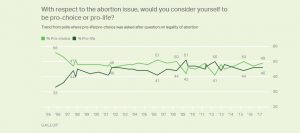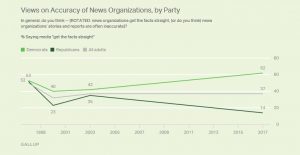In 1996 the GOP candidate for President, Senator Bob Dole of Kansas, used to tick off a laundry list of horribles mostly having to do with charges that President Clinton was sleazy and that a biased liberal press was protecting his Administration. After reeling off the particulars he would then go on to ask rhetorically: “Where’s the Outrage?”
He lost the race, and lost it decisively. Perhaps it was a harbinger.
Today we have no shortage of outrage. In fact we have a surplus of it. And it is constantly being stoked by cynical political operators who rely on confirmation biases to arouse the passions of their respective political bases in order to win the tribal contests we call elections. These elections have increasingly become exercises in identity politics and grievance mongering. The result is that rational governance, nuance and compromise are tossed out the window; policy disputes are criminalized, and mob rule is becoming the order of the day.
The cynicism of the players and the naiveté of the marks (generally the most passionate followers) can be seen by watching how quickly the players change their arguments and how easily their credulous followers swallow them. Consider, for instance, the FBI. They go from black hats to white hats in the blink of an eye, depending on whose ox is being gored.
The truth is that any objective analysis of the FBI’s performance over the years—make that decades—would have to conclude that the FBI has been highly politicized from the outset, and incompetent to boot. J. Edgar Hoover ran the place like it was his private police force, and he had no regard for citizens’ Constitutional rights. Long withheld documents being released today on the Kennedy assassination make it pretty clear that the FBI destroyed evidence after the fact. Robert Hanssen, a senior intelligence officer for the FBI, acted as a spy for Russia from 1979 until 2001 when he was finally caught. Time magazine described the Hanssen case as one of the most damaging in U.S. history.
Then there were the scandals at the FBI crime labs. In 2015 the FBI got around to admitting that almost every examiner in one of its elite forensic crime labs gave flawed testimony over more than two decades in the years before 2000. Of 28 examiners 26 overstated evidence of forensic matches of hair that favored prosecutors 95% of the time in 268 trials reviewed by the Association of Criminal Defense Lawyers and the Innocence Project. These cases included 32 death sentence cases. Of those, 14 defendants were either executed or died in prison.
The FBI is still up to its neck in cover-ups to protect the politically powerful. Consider the Lois Lerner / IRS saga. Just yesterday, on October 26, 2017, the DOJ and IRS settled some of the outstanding Tea Party cases in which the IRS deliberately targeted conservative groups in order to incapacitate them for the 2012 elections. The settlements included payments to the plaintiffs and an apology from the IRS.
It turns out that in the Tea Party cases the IRS handed 21 computer disks to the FBI that contained 1.23 million pages of confidential IRS returns from 113,000 non-profit 501(c)(4) groups, although federal law generally forbids the IRS from sharing such data. By means of Freedom of Information Act lawsuits, Judicial Watch, a conservative watchdog, was able to establish that the IRS, DOJ and FBI met on October 10, 2010 to discuss legal theories about how to criminally prosecute groups “posing” as tax-exempt non-profits, which is to say, Tea Party groups.
And then there is the infamous mishandling of the case of Hillary Clinton’s private e-mail server. In this particular comedy of errors the FBI, through the offices of FBI Director James Comey, ran interference for Clinton to make sure she wasn’t prosecuted even though it is perfectly obvious to anyone who can read that Clinton violated federal law on handling defense information, specifically, 18 US Code 793 (f). The sentence for this crime, by the way, includes up to 10 years in prison.
It is not necessary to belabor the point by citing more cases. It is crystal clear that the FBI has for decades been both politically corrupt and stunningly incompetent. And what has the political establishment done about it?
Nothing.
And what does the commentariat of the left and right have to say? They either cheer or hiss from the bleachers depending on the identity of the FBI’s latest target. Left wing activists were horrified that the FBI infiltrated radical left-wing groups in the 1960s and 1970s. Right wing groups thought it was just swell. Now left wing groups think it’s just great that the FBI is infiltrating “hate groups” and right-wingers have suddenly discovered the fourth and fifth amendments. But do we hear a principled argument from either side that is neutral in its application? Of course not.
And the same goes for the first amendment, particularly with respect to speech and the free exercise of religion. Do the mobs of the left or right defend these fundamental freedoms?
No.
It depends on whose ox is being gored.
So let’s turn to the ever-expanding Russia investigation. What is going on here?
After the smelling salts were duly administered, it finally dawned on the Democratic Party establishment that the country voted to give the keys to the White House to a witless reality TV star by the name of Donald Trump. So the Democrats immediately began the campaign to delegitimize the Presidency of Trump, pretty much before it even got started, which is pretty much what the Republicans did in 1992 to then President elect Bill Clinton. The centerpiece of the campaign was (and is) the charge that but for collusion between Russia and Trump, Hillary Clinton would have been elected President.
Thanks in part to Trumpian buffoonery, there is now a special investigator in the person of Robert Mueller conducting a wide-ranging investigation into possible collusion, as well as Trump’s associates, the Trump campaign, and Trump’s business empire. As a result it appears likely that Paul Manafort, Trump’s campaign manager for a brief period, will be criminally charged, probably with money laundering and various other financial crimes. The other Trump associates in the drama will probably be charged with being stupid, which while true enough, is not yet a felony.
The saga has now taken a new and wholly unexpected turn. It centers on an infamous dossier filled with salacious and unconfirmed reports that circulated widely in the press, which was then published by Buzz Feed. It turns out that none other than Hillary Clinton’s campaign and the DNC financed the dossier, but only after Trump’s Republican opposition stopped doing so when he secured the nomination.
Digging up dirt on the opposition, also known as opposition research, (oppo research) is nothing new. It has been going on forever. That said, there are two factors that come into play here. The first is that this type of stuff is typically low quality and consists largely of rumor-mongering. Second, and more importantly, plenty of the information for the dossier came from Russian operatives, which is to say it may very well have been part of a larger disinformation campaign designed to sow political discontent in the U.S. generally. If so, it succeeded brilliantly—with the help of the FBI.
It succeeded with the help of the FBI because Director James Comey has already admitted that the dossier was one of the reasons he launched the initial investigation into the Trump campaign. So the investigation may be attributable to a Russian disinformation campaign that the FBI fell for like the Keystone Kops. Moreover, if so, it would be the Clinton campaign and the DNC that inadvertently financed the Russian effort.
Apparently the Clinton campaign and the DNC used a law firm as a cut out to pay Fusion GPS to produce the dossier. The idea is that Clinton and the DNC could protect their anonymity while the law firm could argue attorney client privilege. Needless to say, no one at either the Clinton campaign or the DNC has fessed up to authorizing or even being aware of the payments to the law firm. After all, it’s pretty difficult to squawk about collusion with foreign powers when you are funneling cash to operatives of a foreign power to do oppo research.
And speaking of collusion with a foreign power, there is more news about the Uranium One deal. That’s the one where Hillary Clinton, among other cabinet officers, voted to OK the sale of uranium assets to a company that was taken over by a Russian concern, giving Russia a large chunk of U.S. uranium assets. It turns out that while this was going on, the FBI was investigating the companies involved and was prepared to criminally charge them, which would have killed any deal. But they didn’t. Instead they waited for a few years and quietly settled the case with a slap on the wrist. The FBI had an informant in the case who was prepared to testify about it. But the informant had to sign a gag order as part of the settlement deal, and so was not allowed to tell his story.
The informant’s lawyer, Victoria Toensing, has said that there is “on the record quid-pro-quo” around the deal that includes Bill Clinton getting paid $500,00 for making a speech at a Russian Bank, and the Clinton Foundation receiving tens of millions of dollars from people with an interest in the Uranium One deal. For his part, Donald Trump told the Justice Department to lift the gag order so that the informant can testify before Congress. He, the one who refused to release his tax returns, claims it is part of an effort to achieve transparency.
And, by the way, the Director of the FBI was Robert Mueller when the settlement, complete with gag order was negotiated.
Needless to say the argument is now being made that the independence of the DOJ is being threatened by Trump’s order to lift the gag order. There are a number of problems with that argument, not the least of which is that the DOJ is not now and never has been, independent. The Department of Justice is a part of the Executive Branch and answers to the President. And to argue that Justice is independent and apolitical by tradition requires believing that Bobby Kennedy was not Jack Kennedy’s brother; that John Mitchell was not Richard Nixon’s chief defender and an architect of Watergate; that Eric Holder was not Obama’s point man, and that Loretta Lynch and Bill Clinton merely discussed the grandkids on the tarmac.
So what can we conclude from all this?
- All the facts have yet to be revealed and it is still too early to determine whether collusion with a foreign power(s) or other crimes have been committed by any of the major players, and if so by whom.
- However, it is reasonably certain that both Donald Trump, Hillary Clinton and their sycophants have been lying through their teeth about various aspects of these (and other) affairs.
- Most important and in some ways most distressing is the fact that large swaths of the population are so partisan and emotionally invested that they simply do not care who is lying about what. They have picked their side and they are sticking with their side’s story—even as the story changes.
- There is plenty of outrage, but the blinders remain on and firmly fastened.
- There are almost no principled arguments being offered by the combatants. The sole point of the debate is to skewer the other team. It’s probably a reasonable guess that they are all afraid of what the truth may be, because it will show just how craven for the most part, they all are.
Finally, how and why we have arrived at this point is the more interesting question. But that’s another day.
JFB
Please follow and like us:


